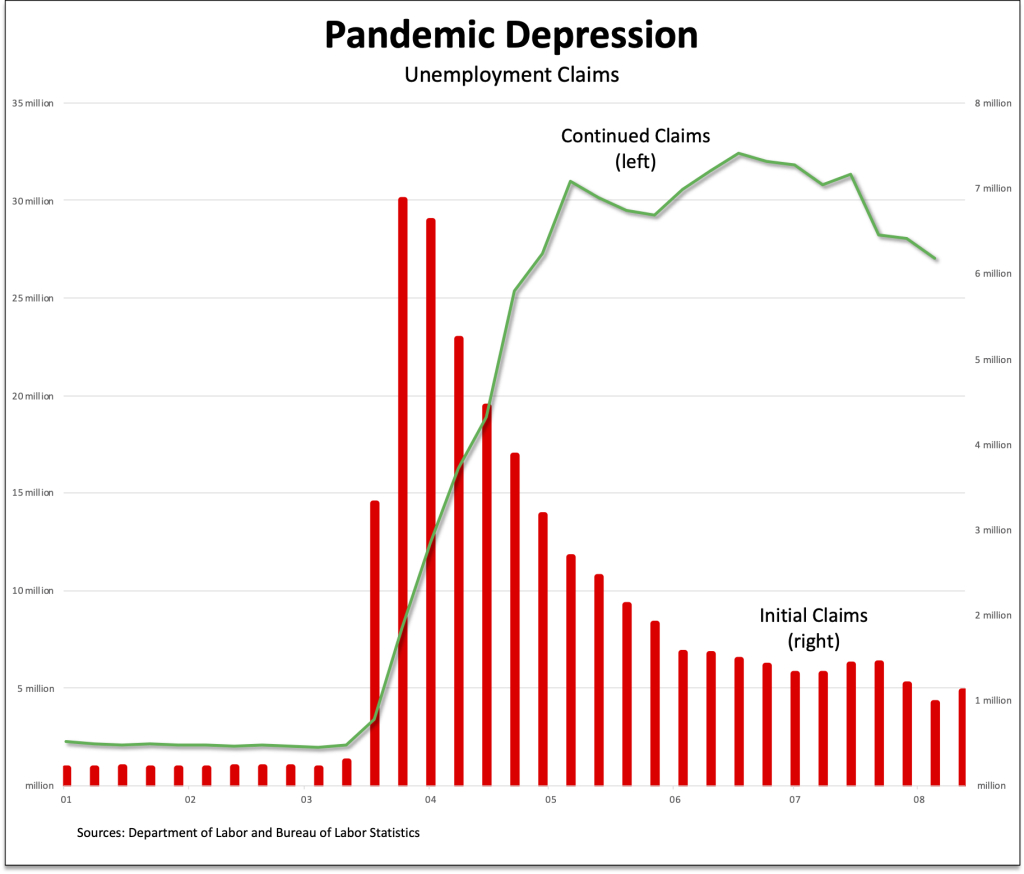From David Ruccio The number of initial unemployment claims for unemployment compensation in the United States once again surpassed one million—for the 21st time in the past 22 weeks—signaling a continuation of the Pandemic Depression. This morning, the U.S. Department of Labor (pdf) reported that, during the week ending last Saturday, another 1 million American workers filed initial claims for unemployment compensation. While initial unemployment claims remain well below the recent peak of about seven million in March, they are far higher than pre-pandemic levels of about 200 thousand claims a week. The number of continued claims for unemployment compensation has also fallen from its peak but the total from the previous week (the series of continued claims lags initial claims by one
Topics:
David F. Ruccio considers the following as important: Uncategorized
This could be interesting, too:
tom writes The Ukraine war and Europe’s deepening march of folly
Stavros Mavroudeas writes CfP of Marxist Macroeconomic Modelling workgroup – 18th WAPE Forum, Istanbul August 6-8, 2025
Lars Pålsson Syll writes The pretence-of-knowledge syndrome
Dean Baker writes Crypto and Donald Trump’s strategic baseball card reserve
from David Ruccio

The number of initial unemployment claims for unemployment compensation in the United States once again surpassed one million—for the 21st time in the past 22 weeks—signaling a continuation of the Pandemic Depression.
This morning, the U.S. Department of Labor (pdf) reported that, during the week ending last Saturday, another 1 million American workers filed initial claims for unemployment compensation. While initial unemployment claims remain well below the recent peak of about seven million in March, they are far higher than pre-pandemic levels of about 200 thousand claims a week.
The number of continued claims for unemployment compensation has also fallen from its peak but the total from the previous week (the series of continued claims lags initial claims by one week) was still 27 million American workers—a figure that includes workers receiving Pandemic Unemployment Assistance.*
To put this number in perspective, consider the fact that the highest number of continued claims for unemployment compensation during the Second Great Depression was 6.6 million (at the end of May 2009), and in the week before the Pandemic Depression began there were only 1.6 million continued claims.
In the meantime, at least 1,193 new coronavirus deaths and 44,934 new cases were reported in the United States yesterday. As of this morning, more than 5.9 million Americans have been infected with the coronavirus and at least 179.9 thousand have died—more than any other country in the world, which has received barely a mention during the Republican national convention.
The result will be new waves of business slowdowns and closures, which in turn will mean millions more U.S. workers furloughed and laid off. Unless there is a radical change in economic policies and institutions, Americans can expect to see steady streams of both initial unemployment claims and continued claims in the weeks and months ahead.
———
*This is the special program for business owners, the self-employed, independent contractors, and gig workers not receiving other unemployment insurance.
